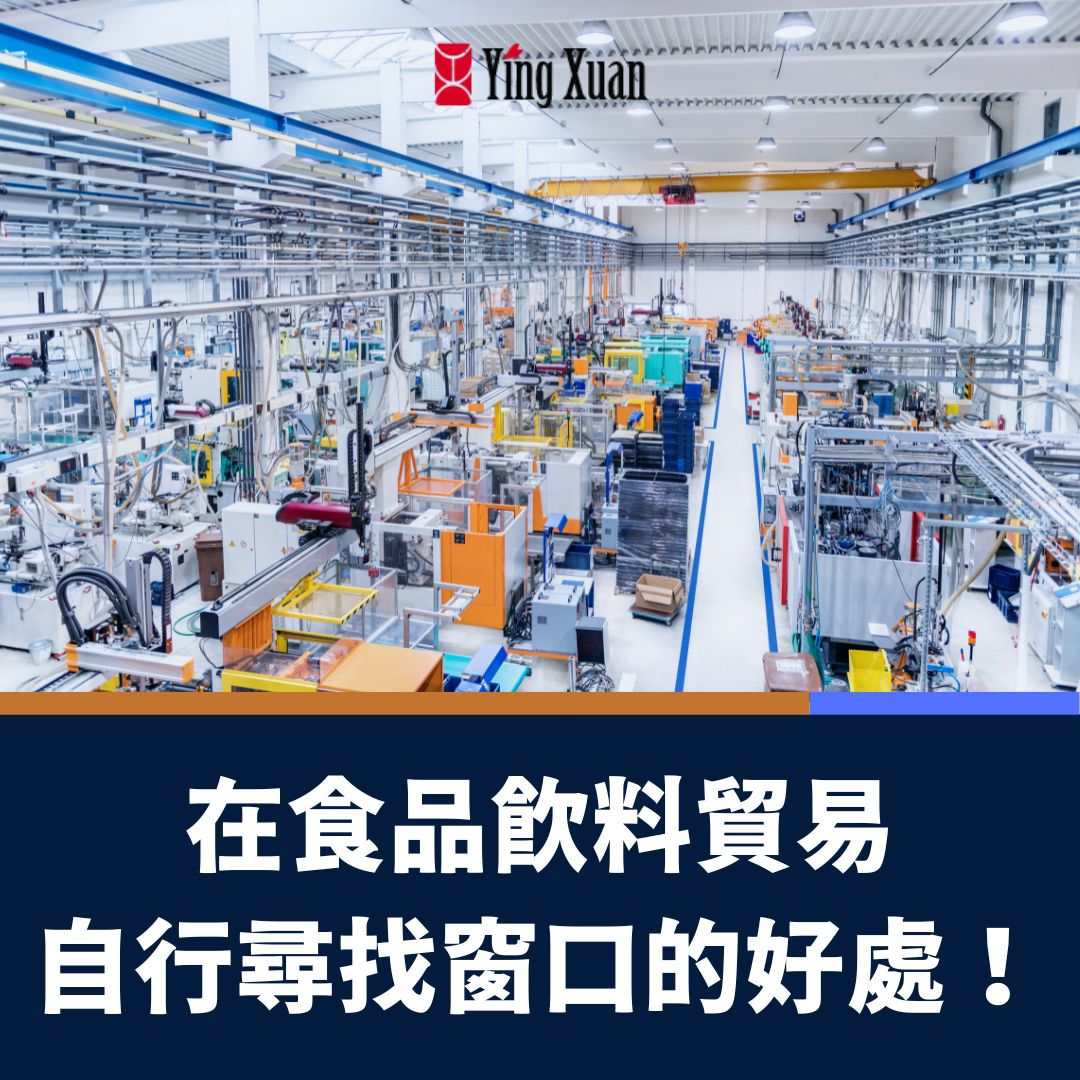Expanding beverage and food import/export business through direct cooperation with sales channels offers multiple advantages. This approach not only enhances business flexibility but also contributes to the independent construction of a brand. Here are the benefits of independently seeking sales channels in the food and beverage trade:

A. Direct Control of the Supply Chain
- Transparency of Raw Material Sourcing: Direct collaboration with import/export windows allows companies to gain insight into the source of raw materials, ensuring compliance with quality and safety standards. This helps reduce potential risks and enhances product traceability.
- Monitoring of Production Processes: Through direct cooperation, companies can more effectively monitor the production processes of beverage and food import/export, ensuring adherence to quality standards and process controls in production facilities.
- Optimization of Logistics and Delivery Times: Direct control of the supply chain enables more flexible management of logistics and delivery. Companies can optimize transportation routes, reduce inventory times, improve delivery efficiency, and lower inventory costs.
- Collaborative Cooperation and Innovation: Establishing a direct cooperative relationship with import/export windows fosters collaborative cooperation and innovation. This allows companies and windows to jointly develop new products and improve existing ones to meet evolving market demands.
飲料食品貿易自行找上銷售窗口的協同合作
B. Flexible Collaboration Conditions
- Delivery and Payment Conditions: Directly seeking import/export windows provides companies with greater negotiating power, allowing for flexible adjustments to delivery and payment conditions based on market changes and business needs.
- Collaboration Duration and Agreements: Flexible collaboration conditions include the adaptability of collaboration duration and agreements. Companies can adjust the timeframe and content of cooperation based on market conditions and business requirements, ensuring flexibility in the ever-changing market environment.
- Product Customization and Improvement: Direct collaboration empowers companies to discuss and negotiate product customization and improvements with import/export windows. This flexibility helps provide products that better meet market demands, enhancing competitiveness.
- Adaptation to Regulations and Standards: Dealing with the complex regulations and standards of beverage and food imports requires the ability to quickly adapt. Direct collaboration allows both parties to respond rapidly to regulatory changes, ensuring product compliance and reducing potential risks.
飲料與食品貿易要掌控品質和效率
C. Control of Quality and Efficiency
- Strict Quality Management: Direct cooperation enables companies to implement rigorous quality management measures throughout the entire production process, from raw material procurement to manufacturing, using advanced quality control methods and technologies.
- Optimization of Production Processes: Collaboration with import/export windows allows companies to optimize production processes, improve production efficiency, and lower production costs by enhancing production equipment, streamlining manufacturing processes, and introducing automation.
- Real-time Data Monitoring and Feedback: Through direct cooperation, companies can establish real-time data monitoring and feedback systems. This enables the swift detection of production abnormalities and timely adjustments, ensuring that product quality and production efficiency are maintained at optimal levels.
- Continuous Improvement and Innovation: Direct cooperation fosters an environment of continuous improvement. Companies and windows can jointly participate in product innovation and technological advancements, driving improvements in quality standards and efficiency levels.
In summary, establishing a close cooperative relationship not only strengthens current

business collaborations but also provides a platform for mutual development, facilitating long-term cooperation success.
D. Building a Close Cooperative Relationship
- Sharing Information and Goals: Building a close cooperative relationship requires both parties to share information and goals, including market trends, product innovation, and long-term development plans. This shared information enhances mutual understanding and helps formulate more effective business strategies.
- Transparent Communication Channels: Close cooperation necessitates transparent communication channels. Direct cooperation allows both parties to establish direct communication channels, reducing the risks of information distortion and misunderstandings. This facilitates quick issue resolution, improves work efficiency, and ensures the smooth progress of the cooperative relationship.
- Shared Values: Establishing a close cooperative relationship requires shared values and culture. This common foundation enhances trust and promotes the smooth progress of joint cooperation. Shared values also make it easier for both parties to address challenges and capitalize on market opportunities together.
- Mutually Beneficial Cooperation and Long-term Agreements: Close cooperation typically involves mutually beneficial cooperation and long-term agreements. This includes jointly formulating long-term development plans, investing in innovation projects, and establishing a stable supply chain system. Such agreements contribute to mutual growth, forming a stable and sustainable cooperation model.
In conclusion, building a close cooperative relationship not only strengthens current business partnerships but also provides a platform for mutual development, promoting long-term cooperation success.

E. Independent Brand Building
Through independently seeking import/export windows, companies have the opportunity to actively participate in building their own brands, enhancing brand image, and gaining competitive advantages.
5.1 Brand Story and Identification: Independent brand building begins with a clear and unique brand story. Companies can collaborate with import/export windows to determine the product’s unique features, value propositions, and establish a distinctive brand identity. This helps create an outstanding brand image in the market and improves brand recognition.
5.2 Product Packaging and Design: Independent brand building includes careful management of product packaging and design. Collaboration with import/export windows allows companies to create visually appealing and brand-styled product packaging, leaving a lasting impression on consumers and increasing purchase intent.
5.3 Development of Marketing Strategies: Building an independent brand requires the formulation of clear marketing strategies. Companies can collaborate with import/export windows to develop targeted marketing plans for the target market, including promotional activities and social media marketing. This helps increase brand exposure and expand market share.
5.4 Assurance of Product Quality: Successful establishment of an independent brand requires a high level of assurance of product quality. Companies should collaborate with import/export windows to ensure that products meet high standards of quality and safety. This not only increases consumer trust in the brand but also contributes to the stable elevation of long-term brand value.
5.5 Continuous Innovation and Upgrades: Independent brand building is an ongoing process of innovation and upgrades. Companies should maintain a close collaboration with import/export windows, introducing new product features and technological innovations to meet the constantly changing market and evolving consumer needs.
In conclusion, independent brand building is a crucial step for companies to establish a unique position in the market. Through collaboration with import/export windows, companies can more comprehensively and successfully achieve brand-building goals.
Comparison Table of Pros and Cons of Independently Managing Sales Channel Windows
| Pros | Cons |
| Directly managing the supply chain to ensure product transparency. | It takes time and resources to find suitable suppliers. |
| Flexible collaboration conditions are advantageous for responding to market changes. | Potential risks and uncertainties in cooperation may be encountered. |
| Control of quality and efficiency to enhance product quality. | May require more management and coordination work. |
| Establishing a close cooperative relationship to foster long-term collaboration. | May require addressing international trade regulations and standards. |
| Participating in independent brand building to enhance brand image. | Building an independent brand may require additional investment. |
If you have read the above content and are looking for professional beverage and food import-export traders, please feel free to contact us.




